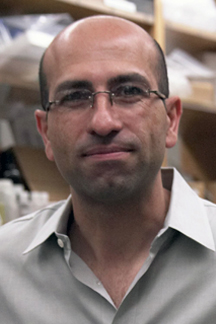Team Awarded $4.4 Million to Investigate 10-Minute DNA Sequencing Technology
By Madeline McCurry-Schmidt
Scientists at The Scripps Research Institute (TSRI) have been awarded a four-year $4.4 million grant from the National Human Genome Research Institute to advance DNA sequencing technologies.
“If we can inexpensively, rapidly and accurately sequence the whole genome, cancer treatments could be different and monitoring someone during the course of treatment would be different,” said Professor M. Reza Ghadiri, who is principal investigator of the grant.
Ghadiri will develop “lab on a chip” technology, technically known as protein nanopore arrays, working toward techniques that could be used by physicians for DNA sequencing to better tailor care to the individual patient.
In nanopore-based DNA sequencing, single strands of DNA pass through microscopic holes while the holes “read” the bases in the DNA sequence by detecting changes in electrical conductance. Current technology takes at least one week to sequence an entire genome, but Ghadiri hopes that by creating an array with thousands—or even millions of nanopores—the DNA-sequencing process could be completed in 10 minutes. Ghadiri said developing a more efficient process would also help lower the cost of sequencing and make it more practical for patients and their doctors.
Ghadiri will work closely with Professor Hagan Bayley at Oxford University. For the new project, the team will be scaling up work it started more than 10 years ago. Back then, sequencing a human genome cost about $10 million. Today, thanks to advances in DNA sequencing technology, the cost has come down to nearly $1,000.
The work at TSRI is part of a larger $14.5 million effort by the National Institutes of Health (NIH) to accelerate a variety of advanced DNA-sequencing methods. The number for this NIH grant is R01HG003709.
Send comments to: press[at]scripps.edu














